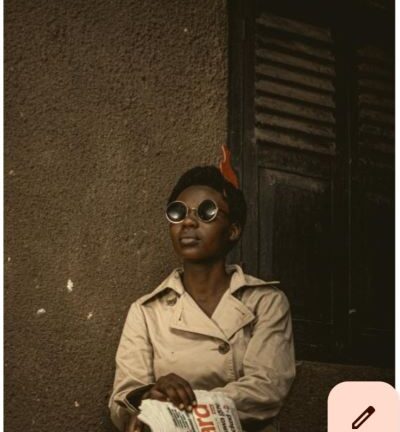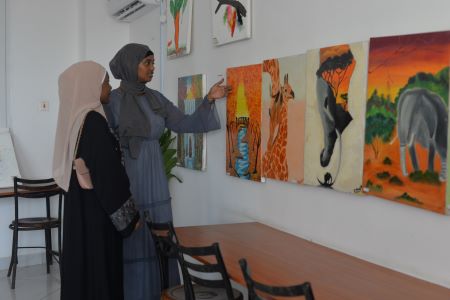Glorious Olajire
Art speaks, keeps and sustains memories. The art creator has a craft, an ability to capture happenings and bear them in a physical or digital frame that elicits distinct emotions to the viewer. This feeling of being in the room with the subject, or getting an understanding of their history and even relatedness is a skill, that very few artists master.
“I grew up just loving art so I would see my venture into photography as just an extension for my love for art” says Ene Ochayi, a documentary film maker and photographer who grew up in the rural areas of Benue State.
Ene’s background and love for art, influenced her desire to “freeze moments, capture activities and, preserve memories. Ene is a lawyer, with a degree from the University of Benue, Nigeria, and her background in Law also influences her documentary film making.

Ene Ochayi
“My knowledge of law has really exposed me to the importance of human rights. there’s so much that people don’t know. This has really made me go all out in fighting for the rights of people because I know what the law is.” Ene’s said
Ene’s craft has grown from the first time she held a camera in 2018, to coating her stories in social justice. Her focus includes passion to share stories of everyday people, highlighting their determination and resilience and with intentionality, she and her team connects them with non-governmental organizations that elevate them from adverse situations.
They do not just document stories, they drive humanitarian efforts and campaigns for social change. “The foundation also engages in a fundraising activities. The proceeds are often used to give relief materials to these people”, her project manager, Joan Ramadan added.
Ene’s work has also garnered collaborations with legal and advocacy education non-governmental organizations like Feivel Justice Initiative. “This particular production, was a visual for a campaign on voting rights in 2023. The Nigerian 2023 elections were decisive and emotion provoking time for youths. This election rights’ campaign piece is a reminder to Nigerians of the value of their vote”. Joan Ramadan , the programme manager shared her perspective on the campaign photography.
“This particular picture was a personal picture she [Ene] took to explain to people about the importance of them not selling their votes. Feivel Justice initiative decided to take permission from her to use the picture for them to also talk about the narrative” Ene Esther shared as she showed the journalist one of the photos.
Ene Esther, the Executive Director of Feivel Justice Initiative also said that “Ene shares some stories she encounters during her work which we try to give visibility to”
One of the projects, the Bokos Massacre’ which occurred on the 25th of December 2023 also got her a recognition as the justice hero for January 2024. Ene spotlighting awareness to this gross display of inhumanity and violation of the people’s fundamental human rights, such as right to life. earned her the award because it goes to the core of the organization which is focused on advocating for human rights,
Fundraising is a major part of any Ene Ochayi production or documentary. With help from foundations like the V.I. Joseph foundation and well-meaning individuals who send in their own personal contributions; fund received are used to fund logistics and relief materials, which include food, books, and money to help people start businesses.
“The last outing I went for in December, I saw a lady who teaches the Children and was lacking school materials. I reached out to my friend that was part of an NGO focused on providing education for underprivileged Children.” Ene shared.
Apart from fundraising, before any documentary trip, Ene always tries to do adequate research; “First of all, I must have gone before time to get to know the location. During this research trip, I make one or two friends who can help facilitate easy of my job and then go back and prepare. “This advance visiting, research trip also me to get as much foundational information that would have been otherwise unavailable to them” Ene claims.
The major part of Ene and that of the foundation work is to document a story. Although Ene’s camera is always with her, she does not make this obvious so as not to scare people or attract unnecessary attention. On an average field trip, and depending on the location, Ene, and a camera assistant is the perfect team. There is always an exception if the locals in the location speak a language that she cannot, and she is not familiar with the area. Before the camera comes out, she gets the people familiar with her, even “if I have to play with the kids.”, which she loves doing.

The value of African photography and film making in driving social change, is perfectly situated in her piece Afrocentric, a celebration of the African skin. Some of our project is to project this and make African to be comfortable in their own skins instead of trying to be like other nations in the west.
Ene’’s mantra is to find beauty in anything, transfers to the people she covers and the stories she pursues. Although the documentary on the Bokos massacre in Plateau state was a gruesome and painful experience, Ene found a way to capture the resilience and unity evident in the communities affected.
From the documentary and visuals from the project “You could still see oneness because all of them experience the same kind of thing” Joan said. You could see it on their face, regardless of their pains, people refused to give up on life. The people are not ready to give up their homeland. They are persistent on taking back their homeland. Ene has a way of communicating with these people” Joan added.

Beyond the pictures, the team also keeps in touch with the people whose stories they cover. Joan explained that “One of the things we do is we maintain contact of the people. So in case there are any relief materials for them, it is easy for us to communicate with them. “We don’t just gather stories and then vanish. Staying in touch with people help the foundation to return with relief materials if we are able to get some for the people in our stories. “Joan also shared
A major problem in our work is Insecurity, “You have to pay security personnel. The truth is no security personnel will want to follow you without you paying for them to accompany you to the location you’re going.” Joan added
Another challenge is getting people in front of the camera. Ene said “People don’t want to get in front of the camera. There are some really captivating stories one will love to feature but once they see the camera, they’re always scared”.
Something I learned about documentary photography is that when you meet with people, try to create a relationship first before bringing out your camera. I feel like I have found a way to mitigate that problem by just having to create relationship first, within the shortest time possible.” Ene Ochayi is inspired by documentary photographers like Mayor Otu from Nigeria”.
Pictures credits: Ene Ochayi




